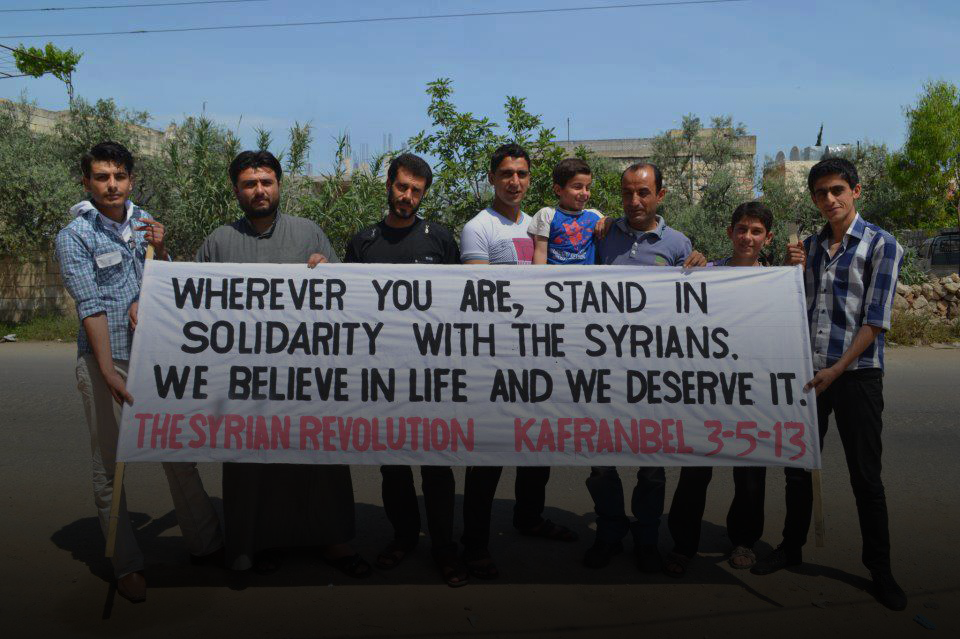This week marks ten years since the start of the Syrian revolution. Inspired by the revolutions in Tunisia and Egypt, Syrians dared to dream of change and took the streets to demand freedom and dignity after 40 years of dictatorship.
It has also been ten years since my last visit to Damascus, the city I loved so much and that felt like my second home. Change was in the air. Before March 2011, I would only hear about what was really going on in Syria behind closed doors. But suddenly activists, with whom I’d been working together under the radar for years, started speaking openly and excitedly about the unstoppable revolt. For the first time, we could talk about politics outside during a walk. For the first time, we could meet up in cafes and talk about what was really going on instead of locked up in an office. They told me about the teenagers that had been arrested in Deraa and about a demonstration that was supposed to take place the next day at the Ministry of Interior to demand the release of political prisoners. I saw a kind of excitement and hope that I hadn’t experienced before. But there were also concerns. One of my friends, an older intellectual who published books about nonviolence and organized workshops about nonviolent activism in his house , said: “We are not ready. But the youth can no longer be held back.”
Trust in each other
Days after my last visit to Damascus, protests broke out in different places in Syria and soon started to grow and spread throughout the whole country. For the first time people started to feel free and regained their dignity. People from all social, geographical and religious backgrounds started to work together and trust each other for the first time. It was like a dream coming true. People took control over their own villages and neighborhoods, they organized local councils and established civil society organizations.
Regime’s response? Brutal force!
The Assad regime responded with brutal force. First with snipers, then with tanks and shelling and later with chemical attacks, starvation and air strikes. Revolutionaries became divided about the use of force, since many people felt like they had to defend themselves, their families and their neighborhoods. The regime systematically wiped out the peaceful forces by killing them, imprisoning them or chasing them out of the country. The armed actors started to become more and more dominant. Regional and international powers got involved, the influence of radical groups grew and slowly but surely the situation developed into one of the most violent conflicts in recent history.
The Assad regime is still in power today, thanks to the support of Russia and Iran. Half of the population has been displaced, of which more than five million as refugees outside Syria. The UN stopped counting the dead after half a million. Tens of thousands of people have been detained or disappeared. Two-thirds of the Syrian population is dependent on humanitarian aid to survive. And although Syria used to be a middle-income country ten years ago, 90% of the population now lives under the poverty line. The war has again deprived them of the dignity they had retaken in 2011.
The world is tired of Syria
Over time, the world has grown tired of Syria. Next week, the EU and the UN will convene international donors for the fifth time in the so-called ‘Brussels Conference’ to mobilize support for Syria. Hardly anyone still believes there is hope for change. Only the most necessary humanitarian aid is still secured, but support for civic initiatives that work for change from within has become scarce. Even the Dutch government decided in October 2018 to stop funding civic initiatives and only provide humanitarian aid inside Syria. By ending support peacebuilding and human rights initiatives inside Syria, the Netherlands suggests it has given up all hope for change.
Voting for the first time, in the Netherlands
This week, some of my Syrian friends will for the first time vote in free and democratic elections. Not in Syria, as they had dreamed of ten years ago, but in the Netherlands where they have settled as refugees and have now become citizens. They have a strong sense of responsibility, they enjoy that they have democratic rights and duties and are seriously researching each political party’s political stance. On the one hand this is beautiful to witness, but on the other hand it shows how far away the hope for a better Syria has drifted. Few Syrians dare to dream anymore. Most of them are just trying to survive.
“We dared to dream”
These days, media and aid organizations are calling attention for ’10 years of war’ in Syria, describing the humanitarian disaster in the country. But by doing so, they ignore the incredible courage and strength of the Syrians who stood up in 2011. Once again, they rob them of their dignity by portraying as victims in need of aid. For Syrians, this week doesn’t mark ten years of war, but ten years since the start of the revolution. This is captured in the phrase: “We dared to dream and we will not regret dignity”, a phrase embroidered on the dress film maker Waad al-Khatib’s wore at the Oscars ceremony. And that is a reminder to all of us that, ten years ago, Syrians had the courage to do something no one thought was possible. Let our 10 years commemoration be a tribute to their courage and creativity. A tribute that must lead to continuous efforts and solidarity, of civilians and of organizations such as PAX, but also of the Dutch government, to ensure that freedom and dignity for the sake of which this all started ten years ago will continue to be our goal.




